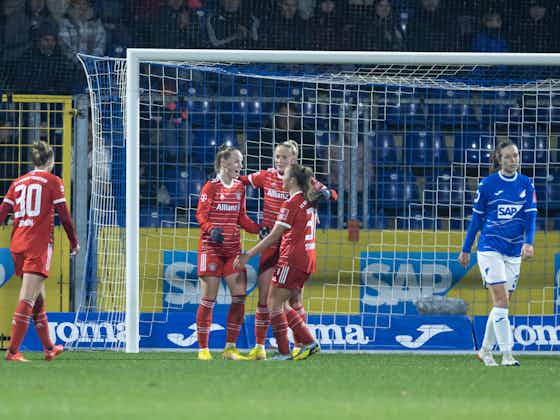Her Football Hub
·7 December 2022
Bundesliga: Bayern München analysis vs Hoffenheim

Her Football Hub
·7 December 2022

Bayern München sit second in the table behind Wolfsburg, a familiar place the Bavarians hope to surpass by the end of this season. This hope is a tall order. Wolfsburg are ruthless, multi-faceted, and have a deeper bench than just about every team in Europe. As for Bayern, Alexander Straus has certainly made his mark. His side is technical, creative, and flexible. A 2-1 humbling to Wolfsburg and a 0-0 draw with Eintracht Frankfurt call into question the effectiveness of the Straus methodology. This article will analyse Bayern’s 4-0 win over Hoffenheim this past weekend and how Straus maximised individual strengths.
Against Hoffenheim, Bayern set up in a 4-4-1-1 with Linda Dallmann and Lina Magull sitting as the wide midfielders. This formation quickly shifts to a 3-4-3 when building out of the back. Sarah Zadrazil commonly dropped next to Tainara on the right to accommodate for Carolin Simon and Maximiliane Rall forward progressions. This position was also achieved by dropping Magull or Dallmann into this space or shifting the weak-sided center back across for the strong-sided fullback to move forward.
The forward movement of the fullbacks created an overload in midfield. This was then used to form passing triangles in wide areas. These passing triangles allowed Bayern to play into their midfield or play directly to a forward making a wide run. This ultimately allowed Bayern to make crosses into the box and build on attacking movements from midfield.
After the loss of Giulia Gwinn, overloading in midfield by utilizing overlapping fullbacks became difficult. With an excess of world-class midfielders, Straus has played one of Dallmann, Magull, or Lohmann as a forward winger. Although this allowed for the rotation of central players into wider areas, it did not provide enough coverage behind the fullbacks. It also left significant gaps in defensive midfield.
If Zadrazil dropped behind Rall, this gave Magull the ability to move into midfield. Magull then added to the unpredictability in midfield, making runs between the Hoffenheim players and maneuvering the ball in tight spaces to advance play.
On the opposing flank, Dallmann played a similar role. When Caro Simon pushed forward, Dallmann pulled central, typically in more advanced areas. This allowed Bayern to form a makeshift front three. As a result, more options were in the box to get on the end of crosses. Dallmann could also run at the opposition to open up spaces once Hoffenheim’s defenders stepped.
Additionally, the clever positioning of Sydney Lohmann behind Klara Bühl added to chance creation in central areas. Bayern were able to maximize Lohmann’s defensive abilities while permitting her to drive forward to advance play. Bühl, though unfamiliar with the role of a central striker, made runs into wide spaces to put crosses into the box. Lohmann and Dallmann shifted across to make themselves available in front of the goal in Bühl’s absence.
Once Lea Schüller entered the field, she made effective runs in central areas behind the Hoffenheim back line. Schüller is likely to start against Barcelona after netting two goals as a second-half substitute. Linda Dallmann is also unavailable for the matchup.
Although Bayern sorted out their playmaking style in this match, Barcelona is in a different tier of difficulty. Bayern need to rely on a less midfield-heavy strategy for any chance to earn points. Against Wolfsburg however, it remains to be seen how effective a creative approach could be against the German giants.





Live







Live




Live




Live














































